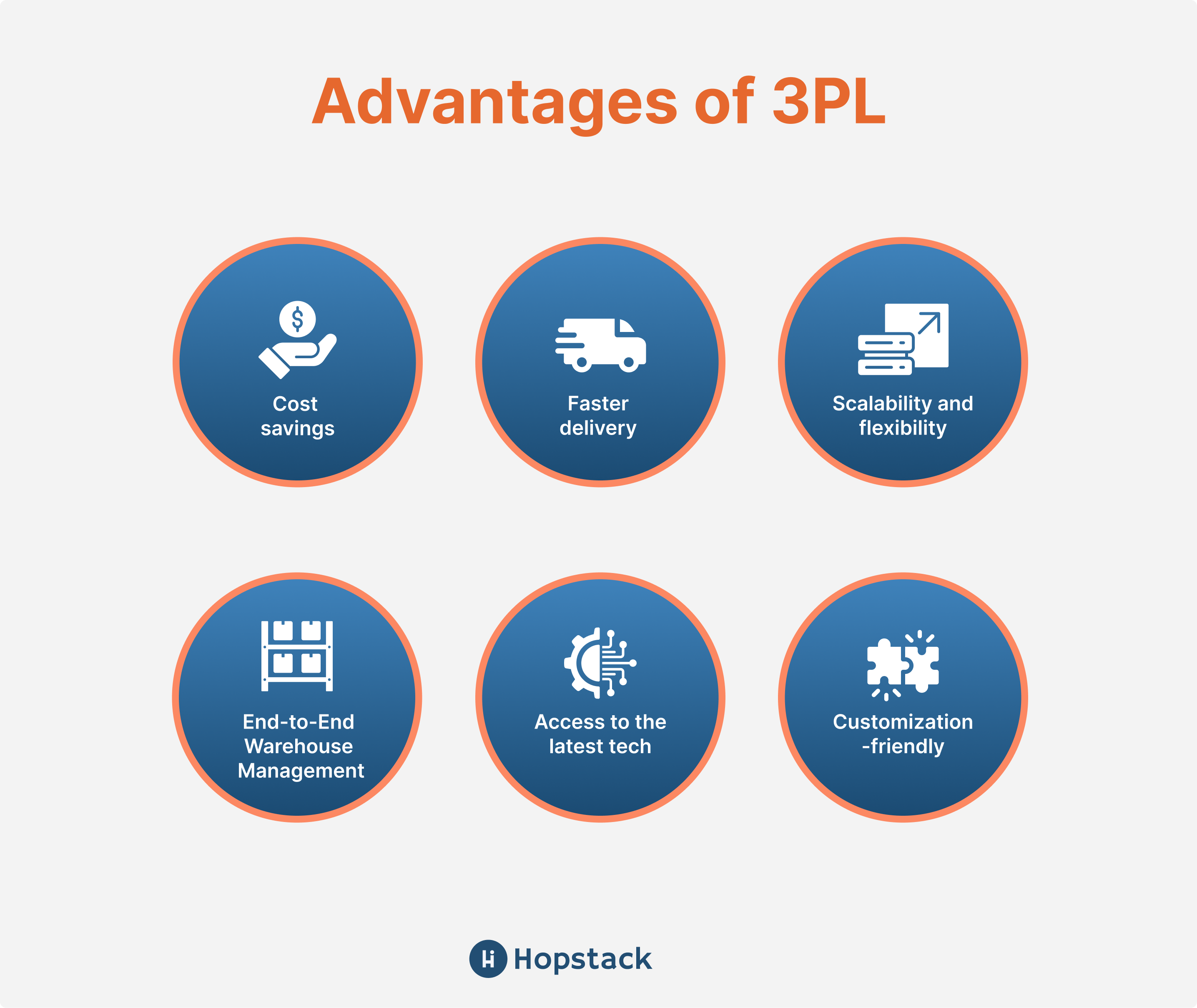In response to the ever-growing demand for faster order fulfillment and shipping, businesses are increasingly turning to third-party logistics (3PL) providers. While these providers offer a myriad of benefits, it is crucial for businesses to be aware of potential drawbacks. This blog aims to provide a comprehensive analysis of the advantages and disadvantages of engaging with 3PLs, empowering businesses to make informed decisions.
Before we delve into the 3PL advantages and 3PL disadvantages, let’s answer the most important question:
What is a 3PL and why is 3PL important?
A 3PL, or third-party logistics provider, is a company that provides outsourced logistics services to businesses. These services can include warehousing, transportation, order fulfillment, and more. Currently, the global 3PL market size is estimated at $1.29 trillion in 2024 and is expected to reach $1.68 trillion by 2029; this shows that more businesses are interested in outsourcing their logistical operations to leverage the benefits of 3PL.
What are the advantages of 3PL?
Here are some of the important 3PL advantages that businesses tend to enjoy while working with third-party logistics providers:
Cost savings
Outsourcing logistics functions to a 3PL provider can result in significant cost savings for businesses. This is one of the biggest 3PL advantages. By leveraging the 3PL's established network, technology, and economies of scale, companies can reduce transportation costs, warehousing expenses, and overall operational expenses. This allows businesses to focus their resources on core competencies, such as product development and marketing.
Faster delivery
E-commerce titans like Amazon and Walmart have made faster deliveries an industry norm, forcing other businesses to follow suit. This is one of the biggest reasons for businesses to seek the expertise of 3PLs. Another major 3PL advantage is most 3PLs specialize in shipping services, which helps them deliver packages in a timely manner using their delivery fleets.
Additionally, most 3PLs operate multiple warehouses throughout the country and can help deliver the packages swiftly to customers.
Scalability and flexibility
3PL providers offer businesses the ability to scale up or down based on their requirements, making it easier for them to adapt quickly to changes in demand and market conditions. This allows companies to avoid the challenges of maintaining excess warehouse space or investing in additional transportation assets during peak periods.
End-to-end warehouse management
Another major 3PL advantage is the end-to-end warehousing solutions they offer – from procuring products from manufacturers to shipping them to customers. When customers place an order, the 3PLs fulfill it promptly and efficiently by shipping the products from the nearest warehouse to the destination. This relieves the burden of inventory management for the eCommerce companies and results in faster deliveries.
This is even more advantageous for small eCommerce businesses that do not have the adequate capital to set up in-house order fulfillment.
Access to the latest tech
To offer the best services to their clientele and meet strict service level agreements, most 3PLs use the latest technologies, such as automated guided vehicles, automated picking tools, warehouse management systems (WMS), transportation management systems, etc. While collaborating with 3PLs, businesses can leverage these technologies and increase supply chain efficiency and accuracy.
Customization-friendly
In the ever-competitive world of commerce, customization and personalization are key factors that can set you apart from the competition. Customization is a 3PL advantage that significantly assists brands. 3PLs provide several customized shipping services for B2C and B2B fulfillment. For example, 3PLs help print customized shipping labels and create personalized packaging for special orders.

What are the disadvantages of 3PL?
As we mentioned earlier in the blog, there are 3PL disadvantages that you must be aware of. Here are some of the common 3PL disadvantages:
Loss of control
One of the primary 3PL disadvantages is the potential loss of control over critical aspects of the supply chain. Businesses may find it challenging to maintain the same level of oversight and responsiveness as they would with in-house logistics operations.
Over-dependence on external partners
Over-relying on a third party for logistics introduces a level of dependence on external partners. If the 3PL provider faces any issues or disruptions, such as delays, quality concerns, or system failures, it can directly impact the business's operations.
Hidden costs
While cost savings are a notable advantage, you must be cautious of potential hidden costs associated with 3PL arrangements. Additional fees for special services, changes in volume, or custom requirements can accumulate, eroding the initially perceived cost benefits. Transparent and detailed contracts are essential to avoid unexpected financial surprises.
Limited customization
Most 3PL providers often operate within standardized processes and systems, limiting the level of customization available to individual businesses. For example, if you are a company with unique or complex supply chain requirements, aligning a 3PL's offerings with your specific needs will be challenging. Remember, these customizations always come with a hefty price tag.

Parting thoughts
In conclusion, the decision to engage with a third-party logistics (3PL) provider involves careful consideration of both 3PL advantages and 3PL disadvantages. Consider 3PL benefits such as cost savings, faster delivery, scalability, efficient warehouse management, and customization, which can significantly enhance a business's logistics operations. This is particularly beneficial if you are a small and medium-sized company seeking to streamline processes, meet customer demands for swift order fulfillment, and focus on core competencies.
However, businesses must also be mindful of the potential disadvantages of 3PL arrangements. The loss of control over critical aspects of the supply chain, over-dependence on external partners, hidden costs, and limited customization options are challenges that need to be weighed against the 3PL benefits.
.svg)




.png)

.png)

